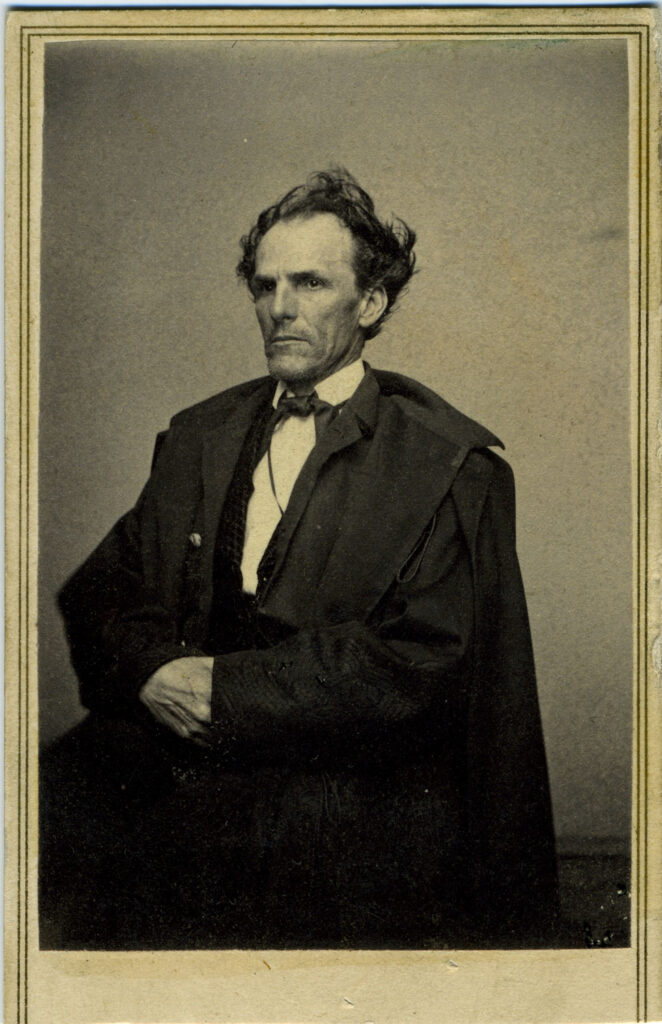Section #16 - Open warfare in “Bloody Kansas” follows fraudulent election wins for Pro-Slave State forces
Chapter 191: Pierce Fires Governor Reeder And Anti-Black Racist James Lane Joins The Free State Movement
August 15, 1855
Pierce Bows To Criticism From The Pro-Slavery Forces
As the summer wears on complaints about Andrew Reeder’s actions as Territorial Governor of Kansas descend on Pierce from Atchison and the Pro-Slavery legislature, meeting since August 8 in Lecompton, in defiance of orders to remain at Pawnee.
The President gives in to the pressure and demands that Reeder resign, effective August 15.
His stated rationale cites a conflict of interest related to Reeder’s ownership of land at Pawnee – the charge being that, as Governor, he ordered that the capital be located there to make a profit on his speculative purchases. True or false, the appearance of a conflict is sufficient to back the dismissal.
Reeder’s response proves surprising. Instead of fleeing from the territory in disgrace, he chooses to sign on with the “Free State Party” side, joins their first convention, and become a leader in their battle against the Pro-Slavers.
His replacement is ex-Ohio Governor, Wilson Shannon, another “doughface” politician, who has recently completed a term in the U.S House. Sworn in on September 7, 1855, he will be gone in eleven months, after failing to stifle the Free State movement.
Key Events In Kansas During Edward Reeder’s Term As Governor
| 1854 | Milestone |
| July 7 | Pierce names Reeder as first Territorial Governor in Kansas |
| July 20 | The Platte County Self-Defense Association founded by David Atchison |
| November 29 | Border Ruffians fraudulently elect pro-slavery JW Whitworth to the U.S. House Reeder reluctantly confirms the voting results |
| 1855 | |
| March 30 | A second fraudulent vote results in a “Bogus Legislature” of pro-slavery men |
| April 6 | Reeder de-certifies illegal votes from six districts |
| June | Reeder travels to DC to seek Pierce’s support for a fair do-over election |
| July 2 | The Bogus Legislature convenes in Pawnee for their opening session Benjamin Stringfellow assaults Reeder for making unfavorable public remarks |
| August 4 | Free-Staters meet in Lawrence to plot a resistance strategy |
| August 14-15 | The Free State Party is founded in a convention at Big Springs Commitment made to write a constitution and submit for admission to Union |
| August 17 | Reeder is fired and Daniel Woodson becomes Acting Governor |
| September | Free-Stater gather at Big Springs |
| September 7 | Wilson Shannon begins his service as 2nd Governor |
| October 1 | Pro-Slavers re-elect JW Whitworth as Representative to the U.S. House |
| October 8 | Free-Staters elect ex-Governor Reeder as their U.S. House representative |
September 7, 1855
The Free Staters Band Together At Big Springs
Back in Kansas, the rallying cry delivered by Charles Robinson on Independence Day leads to a gathering on August 14-15, 1855, in Lawrence aimed at consolidating all opponents of the “bogus” Pro-Slavery legislature. Agreement is reached to hold a convention in three weeks to elect their own state legislature and write a Free State Constitution.
Roughly one hundred delegates, along with other spectators, gather on September 5 at Big Springs, 15 miles west of Lawrence on the old California Trail. Charles Robinson is there, along with now ex-Governor Reeder, and a new voice in the mix, one James Henry Lane, an Indiana native who serves in the Mexican War and then in the U.S. House before coming to Kansas to establish a Democratic Party.

Lane’s men arrive at the Big Springs Convention armed with Sharps Rifles and ready for combat. They fail to share Robinson’s moral opposition to slavery, and want to ban all blacks from crossing into Kansas. As one observer says:
Their hatred to slavery was not as strong as their hatred to Negroes.
Despite these sharp philosophical differences, a “Free State Party” is born at the convention. It is dedicated to forming a government chosen by residents of Kansas and not Missouri. Instead of merely opposing the Pro-Slavery legislature in place, it takes the bold step of electing its own legislature from those present, and then surprisingly chooses Andrew Reeder as it proposed representative to the U.S. House.
The ex-Governor’s closing remarks are ominous — calling upon supporters to procure arms, train up volunteer companies, and prepare for a bloody resistance should peaceful remedies fail.
That we will endure and submit to these laws (the bogus laws) no longer than the best interests of the Territory required, as the least of two evils, and will resist them to a bloody issue as soon as we ascertain that peaceful remedies shall fail, and forcible resistance shall furnish any reasonable prospect of success; and that in the meantime we recommend to our friends throughout the Territory the organization and discipline of volunteer companies, and the procurement and preparation of arms.
Henceforth Andrew Reeder becomes an active leader in the Free State movement.